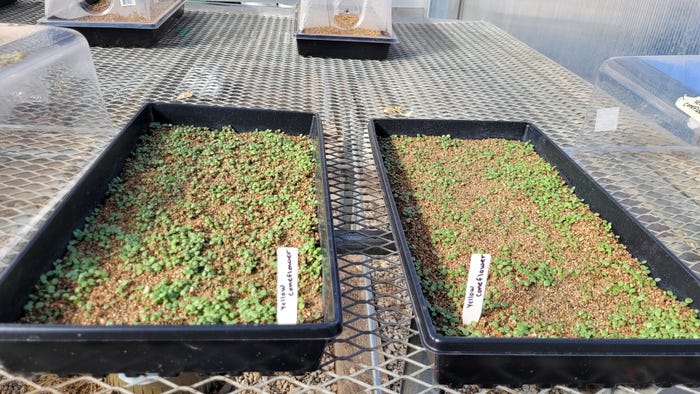June 15, 2023

by Josh Bendorf
In the fall of 2021, Pheasants Forever in Wisconsin began a partnership with the Professional Dairy Producers to offer educational and professional resources. The goal of the partnership is to connect dairy farmers with conservation resources to help them reach their sustainability goals.
Katy Schultz is the co-operator of Tri-Fecta Farm in Fox Lake, Wis., and is the former board president of PDPW. Scott Stipetich, Pheasants Forever precision ag and conservation specialist, and I met with Katy and her brother Nick Schultz in February 2022. We sat around the kitchen table at the farm and discussed their current conservation work and what they were looking to do in the future. From a window near the table, we were able to look out and see the farmstead as we talked.
Problem-solving
The topic of precision ag came up as a way to help guide Katy and Nick where conservation practices could get them the most bang for their buck. If an area of cropland is not producing enough yield to turn a profit, that area presents an opportunity to implement an alternative, conservation-minded practice to increase its profitability. Scott and I can assist farmers like Nick and Katy in the process of yield data analysis and alternative practice design.
Nick mentioned a 14-acre crop field just down the road from the farm that was experiencing low yields along the field’s southern edge. A forested area just south of the field was shading out the crops there, reducing yields. There were also some wet soils in that area. He brought up his Climate FieldView app on his phone and showed us the yield monitor data for this field, which showed a reduction in yield along the southern edge.
The field and forest are owned by the Waupun School District, and Tri-Fecta volunteers time, equipment, fuel, seed and talents to provide a profitable harvest to help support the Waupun FFA Chapter. It became clear to everyone at the table that targeting a conservation project to this area of low yield presented a great opportunity to help increase the profitability of the field while educating Waupun High School agriculture students on conservation practices. It would be a win-win for agriculture and conservation.
Pheasants Forever farm bill biologist Travis Wilder, members of Tri-Fecta Farm and I met with the Waupun FFA advisors at the beginning of the 2022-23 school year to discuss a proposed project idea, timeline and funding opportunities. The project that was agreed upon was converting this strip of low yields along the tree line to a mix of grasses and forbs that would provide quality habitat for pollinators including monarch butterflies.
Sand County Foundation grant
But how would this project be funded? On a state Pheasants Forever web call, Travis and I had learned about the Sand County Foundation’s High School Pollinator Habitat Grant that provides accepted applicants $1,000 for the establishment of a pollinator planting by an FFA chapter. This seemed like the perfect opportunity. Travis and I helped Waupun High School apply for the grant, and it was accepted for funding for a spring 2023 planting.
The Sand County Foundation grant requires students to have hands-on experience in growing native seeds in a greenhouse, which they transplant to the field later in the spring.
By late March, the native forbs the students were growing in the greenhouse had begun to sprout, and by early May, the young wildflower sprouts had really taken off.
Kris Beaver, Waupun High School ag educator and FFA advisor, says kids from his crops and soils class and Tari Costello’s horticulture class — about 40 to 50 students in total — had the chance to be involved with this project and expressed enthusiasm for the project. These classes also allowed students to earn technical college credits.
On May 17, the students came out to Tri-Fecta Farm to plant their native prairie plugs along the southern edge of the 14-acre crop field. In total, the students had grown over 7,000 plugs. About 40 high school students came out to help plant. The mild weather made it a perfect day for planting, and the harvested wheat stubble made for a great seedbed. First, a 30-foot-wide strip around the crop field edge was seeded down with a no-till drill. A couple of students rode on the back of the drill to make sure the seed stayed well-distributed in the seed boxes
After the area was seeded down, students went to work planting their plugs to supplement the drilled-in seed mix. Travis and I pitched in to help the students plant the plugs and answered any questions they had about the project. Thanks to a great effort by everyone, all the seed and plugs were in the ground by early afternoon.
This pollinator project is the result of strong partnerships among agribusiness, conservation and education. Over the next few years, Waupun FFA students will get to drive by this field and see their hand-planted wildflowers in bloom, providing vital habitat for pollinators on working farmland. For farmers or educators interested in doing similar projects, consider applying for the Sand County Foundation’s High School Pollinator Habitat Grant, or reach out to your local conservation professionals for more information on funding programs or technical assistance.
Bendorf is the Wisconsin precision ag and conservation specialist for Pheasants Forever. Pheasants Forever has staff throughout Wisconsin and is able to provide free technical assistance in getting native prairie plants established on your farm.
Read more about:
EducationYou May Also Like




